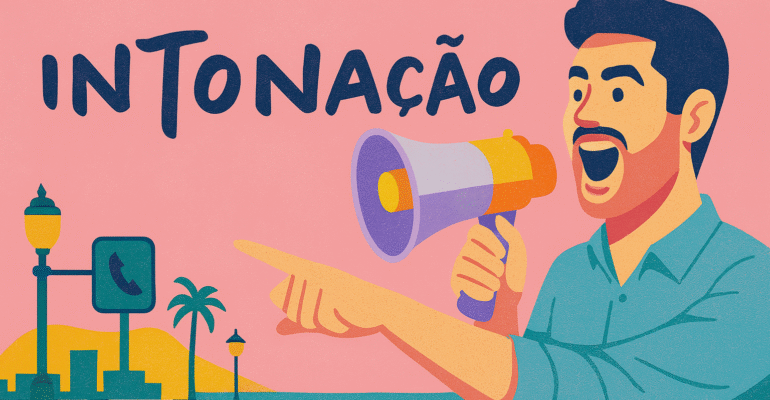Mastering Questions in Portuguese: It’s All About Intonation
Mastering Questions in Portuguese: It’s All About Intonation
If you’re learning Portuguese, you might have noticed that asking questions doesn’t always require changing word order.
Unlike English, where we often rearrange words or add auxiliary verbs (Do you like coffee?), Portuguese frequently keeps the sentence structure the same. The key difference? Intonation.
Raising your voice at the end of a sentence can turn a statement into a question. This small but powerful shift can make your speech sound more natural and help you avoid misunderstandings. Let’s break it down step by step.
Questions with Question Words
When a question starts with words like:
- Quem (who)
- Como (how)
- Quando (when)
- Onde (where)
- Quanto (how much)
…it’s easy to tell that you’re asking something.
✅ Examples:
✔️ Quem é você? (Who are you?)
✔️ Como você está? (How are you?)
✔️ Quando vamos sair? (When are we going out?)
✔️ Onde você mora? (Where do you live?)
✔️ Quanto custa isso? (How much does this cost?)
These questions are straightforward because the question word already signals that it’s a question.
Yes/No Questions: The Power of Intonation
When a sentence doesn’t include a question word, intonation becomes crucial.
In written Portuguese, a question mark (?) does the job, but in spoken Portuguese, your voice must rise at the end to indicate that you’re asking a question.
Let’s compare statements and questions:
✅ Example 1:
✔️ Você é americano. (You are American.) → Statement (neutral tone)
✔️ Você é americano? (Are you American?) → Question (rising tone)
✅ Example 2:
✔️ Ela faz aulas de português. (She takes Portuguese classes.) → Statement
✔️ Ela faz aulas de português? (Does she take Portuguese classes?) → Question
📌 Notice: The word order stays the same, but the intonation completely changes the meaning!
Why Intonation Matters
If you forget to raise your tone, people might think you’re making a statement instead of asking a question. This can lead to confusion or awkward conversations.
✅ Example:
✔️ Você gosta de café. (You like coffee.) → Sounds like a fact.
✔️ Você gosta de café? (Do you like coffee?) → Sounds like a question.
Imagine you meet someone and want to ask if they are Spanish. If you say:
✔️ Você é espanhol. (You are Spanish.) → Sounds like a statement.
✔️ Você é espanhol? (Are you Spanish?) → Sounds like a real question.
Raising your tone helps you sound natural and ensures people understand you correctly.
Practicing Intonation
A great way to master intonation is by practicing with simple sentences. Try reading these aloud, paying attention to how your voice changes:
✅ Practice Sentences:
✔️ Eles moram no Brasil. (They live in Brazil.) → Statement
✔️ Eles moram no Brasil? (Do they live in Brazil?) → Question
✔️ Hoje é segunda-feira. (Today is Monday.) → Statement
✔️ Hoje é segunda-feira? (Is today Monday?) → Question
✔️ Você está feliz. (You are happy.) → Statement
✔️ Você está feliz? (Are you happy?) → Question
✔️ Ele trabalha aqui. (He works here.) → Statement
✔️ Ele trabalha aqui? (Does he work here?) → Question
🎙 Tip: Record yourself saying both versions. Listening to the contrast can help you develop an ear for how questions sound in Portuguese.
A Common Pitfall: Flat Intonation
Some learners struggle with keeping their intonation flat, making their questions sound like statements. This happens because English speakers rely on word order rather than tone to indicate questions.
📌 Tip: When in doubt, exaggerate your intonation a little. It might feel unnatural at first, but with practice, it will start to sound right.
Think of how you express surprise or curiosity in English—that natural lift at the end of a sentence is exactly what you need in Portuguese!
Final Thoughts
Intonation is a small detail that makes a big difference in how natural you sound in Portuguese. Once you get the hang of it, asking questions will feel effortless.
🎯 Your challenge:
Practice these sentences out loud and record yourself. Can you hear the difference?
Want to Master Portuguese Faster?
If you love learning through real conversations, movies, and stories, check out our online courses designed to make Portuguese fun and immersive:
🎬 The Movie Club – Learn Portuguese through Brazilian films and engaging discussions.
📖 The Short Story Club – Improve your reading and speaking skills with hand-picked Brazilian short stories.
🎵 The Music Club – Explore the richness of Brazilian music while enhancing your Portuguese.
Each course is designed to make learning engaging, cultural, and effective. Ready to immerse yourself in Brazilian Portuguese? Visit our website or contact us for more details! 🚀













